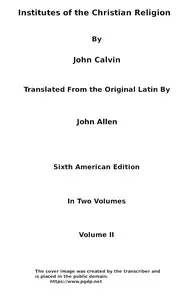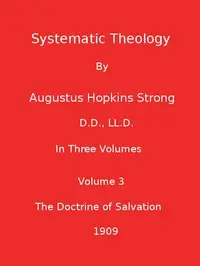"Institutes of the Christian Religion (Vol. 2 of 2)" by Jean Calvin is a deep study from the 1500s about Protestant Christian beliefs. It zeroes in on important ideas like being made right with God, God's kindness, and how faith should change how people live. As a key book for Calvinism, it looks closely at how faith and actions connect when it comes to salvation. It creates a system for understanding Christian faith and how it's practiced. The book starts by considering what it really means to be righteous, grouping people by their spiritual condition and pushing readers to examine their own hearts before God. It claims people cannot become righteous through their own hard work or by following rules, as everyone's actions have flaws and deserve punishment. Instead, it stresses that being truly righteous and justified depends only on faith in Christ and God's kindness, arguing that people are accepted by God because of His mercy, not their own accomplishments. This beginning prepares the way for a deeper look at these important topics later in the book.

Institutes of the Christian Religion (Vol. 2 of 2)
By Jean Calvin
Explore how one's acceptance by God hinges on divine mercy rather than personal achievements, as righteousness is found through faith.
Summary
About the AuthorJohn Calvin was a French theologian, pastor and reformer in Geneva during the Protestant Reformation. He was a principal figure in the development of the system of Christian theology later called Calvinism, including its doctrines of predestination and of God's absolute sovereignty in the salvation of the human soul from death and eternal damnation. Calvinist doctrines were influenced by and elaborated upon the Augustinian and other Christian traditions. Various Congregational, Reformed and Presbyterian churches, which look to Calvin as the chief expositor of their beliefs, have spread throughout the world.
John Calvin was a French theologian, pastor and reformer in Geneva during the Protestant Reformation. He was a principal figure in the development of the system of Christian theology later called Calvinism, including its doctrines of predestination and of God's absolute sovereignty in the salvation of the human soul from death and eternal damnation. Calvinist doctrines were influenced by and elaborated upon the Augustinian and other Christian traditions. Various Congregational, Reformed and Presbyterian churches, which look to Calvin as the chief expositor of their beliefs, have spread throughout the world.

















